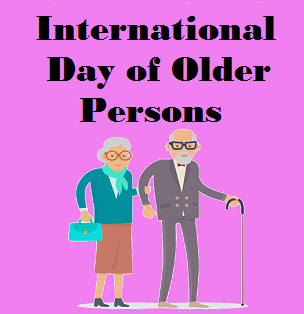On 14 December 1990, the United Nations General Assembly designated 1 October the International Day of Older Persons.
Between 2015 and 2030, the target date for the Sustainable Development Goals, the number of older persons worldwide is set to increase by 56 per cent — from 901 million to more than 1.4 billion. By 2030, the number of people aged 60 and above will exceed that of young people aged 15 to 24.
Ageism is a widely prevalent and prejudicial attitude that stems from the assumption that age discrimination, and sometimes neglect and abuse of older persons is a social norm and therefore, acceptable. It is a reality in some form in all societies, and finds expression in individuals’ attitudes, institutional and policy practices, as well as media representation that devalue and exclude older persons. In 2014, Governments around the world adopted a resolution at the Economic and Social Council that recognized ageism as “the common source of, the justification for and the driving force behind age discrimination.”
On 14 December 1990, the United Nations General Assembly (by resolution 45/106) designated 1 October the International Day of Older Persons (UNIDOP), which seeks to promote an age inclusive agenda.
Theme for 2020
The theme of the 2020 commemoration is “Pandemics: Do They Change How We Address Age and Ageing?“.
The 2030 Agenda and the Sustainable Development Goals (SDGs) recognize that development will only be achievable if it is inclusive of all ages. Empowering older persons in all dimensions of development, including promoting their active participation in social, economic and political life, is one way to ensure their inclusiveness and reduce inequalities.
The year 2020 marks the 30th Anniversary of the International Day of Older Persons. This year has also seen an emergence of COVID-19, that has caused an upheaval across the world. Considering the higher risks confronted by older persons during the outbreak of pandemics such as COVID-19, policy and programmatic interventions must be targeted towards raising awareness of their special needs. Recognizing older persons contributions to their own health and the multiple roles they play in the preparedness and response phases of current and future pandemics is also important.
This year has also been recognised as the “Year of the Nurse and Midwife”. International Day of Older Persons 2020 will highlight the role of the health care workforce in contributing to the health of older persons, with special recognition of the nursing profession, and a primary focus on the role of women – who are relatively undervalued and in most cases inadequately compensated.
The 2020 observance will also promote the Decade of Healthy Ageing (2020-2030) and help bring together UN experts, civil society, government and the health professions to discuss the five strategic objectives of the Global Strategy and Action plan on Ageing and Health while noting the progress and challenges in their realization. The global strategy is well integrated into the Sustainable Development Goals ( SDGs), while ageing issues cut across the 17 goals, especially Goal 3 which aims to “ensure healthy lives and promote well-being of all at all ages”.
The 2020 theme aims to:
- Raise awareness of the special health needs of older persons and of their contributions to their own health and to the functioning of the societies in which they live.
- Increase awareness and appreciation of the role of the health care workforce in maintaining and improving the health of older persons, with special attention to the nursing profession
- Present proposals for reducing the health disparities between older persons in the developed and developing countries, so as to “Leave no one behind”.Increase understanding of the impact of COVID-19 on older persons and its impact on health care policy, planning, and attitudes.
The Madrid International Plan of Action:
The Political Declaration adopted in Madrid, Member States reaffirmed their commitment to the promotion and protection of human rights, and called for the elimination of age discrimination, neglect, abuse and violence. More specifically, the Madrid International Plan contained guidance on the right to work, the right to health, participation and equality of opportunity throughout life, stressing the importance of the participation of older persons in decision-making processes at all levels.
Madrid International Plan of Action include a wide range of issues: equal employment opportunities for all older persons; programmes that enable all workers to acquire social protection and social security, including, where applicable, pensions, disability insurance and health benefits; and sufficient minimum income for all older persons, with particular attention to socially and economically disadvantaged groups. The importance of continuous education, vocational guidance and placement services are also stressed, including for the purpose of maintaining a maximum functional capacity and enhancing public recognition of the productivity and the contributions of older persons. Health is also a key feature of the Madrid Plan of Action. The provisions encompass notions of respect to older persons and the full functionality of supportive and care-giving environments.
Source : United Nations



